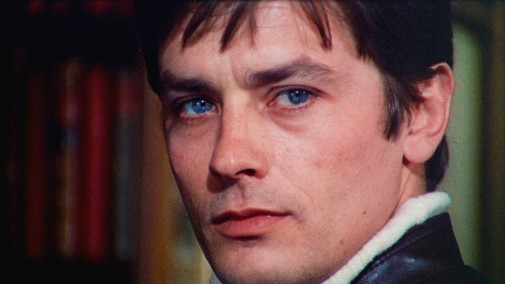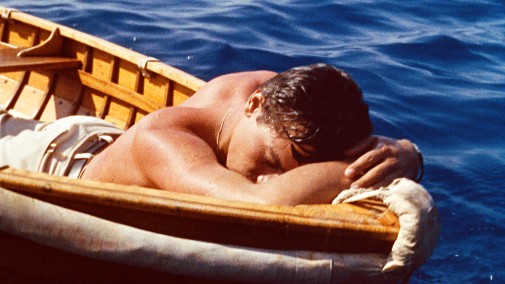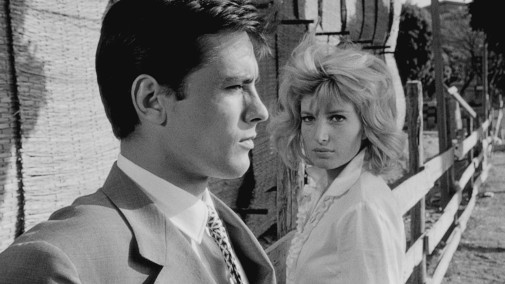
For some people, the word handsome isn't enough. Such beauty defies description and almost seems to bend reality, becoming uncanny in its perfection. French star Alain Delon is one such person. It's no wonder that many a master filmmaker has lost themselves looking at the actor, making devotional songs to his besotting allure in the shape of cinema. Antonioni, Clément, Godard, Malle, Melville, Visconti were some of those masters of cinema and their works have immortalized Alain Delon in poems of celluloid that are some of the best films ever made…
In the face of his odious words in old age, it's easy to see why modern cinephiles would want to avoid hagiographic homages and turn their back to this celebrity. One wouldn't blame anyone for rejecting Delon. Still, thanks to a new collection on the Criterion Channel, we are reminded of the quality of his filmography. Despite being a reproachful man, Alain Delon is also a fascinating actor, an aesthetic phenomenon of immeasurable sensuality, an unforgettable movie star. If you doubt such praise, take a look at some of the highlights from Criterion's selection.

PURPLE NOON (1960)
Directed by René Clément and adapted from Patricia Highsmith's The Talented Mr. Ripley, Purple Noon is a tale of social facades and bloody deception. A dream of eroticism with a sharp edge of danger, the film's so beautiful we can almost feel ourselves turn to mush while gazing at its crystalline images. In the role that would later be embodied by Dennis Hopper, Matt Damon, and a panoply of other actors, Alain Delon delivers a performance of frightening emptiness. His Tom Ripley's a perfect manifestation of surface-level attraction, a void that sucks in other people that are too dazed to notice his vampirical wiles. It's a masterclass of lacing lust with cyanide, a beguiling star turn that made Delon into an international sensation.
For a more leather-clad sort of sexiness, Criterion's also streaming Delon's psychedelic The Girl on a Motorcycle. That's a film that positively erupts in paroxysms of lust.

ROCCO AND HIS BROTHERS (1960)
If the young Alain Delon looked menacingly hypnotic in full-color, he's ethereal when shot in black-and-white. Luchino Visconti knew how to take full advantage of that, molding the titular character of Rocco and His Brothers into the near-religious image of an icon. Bloody, crying, utterly vulnerable, and beaten down for other people's enjoyment, Delon's Rocco looks like he belongs on a church altar rather than in the streets among mortals. As for the film that contains and punishes him, Rocco and His Brothers is a triumph of transcendent melodrama, a tearstained affair that's as close as Italian Neorealism ever came to opera.

L'ECLISSE (1962)
Alain Delon may be beautiful, but he's also an unnerving screen presence. His eyes are pools of impossible depth, as gem-like as they are inscrutable. Because of that, it's interesting to note that one of his looser performances comes from the film he did with the king of cinematic alienation, Michelangelo Antonioni. The last chapter in the director's trilogy of "incommunicability" is a shot of existential unrest injected straight to the audience's veins. The end of L'Eclisse is justifiably legendary, and it proves that Delon's presence is so intense, its ghost haunts the film even after the man evaporates into nothingness.

LE SAMOURAÏ (1967)
No filmmaker that better understood the reptilian magic of Alain Delon than Jean-Pierre Melville. 1967's Le Samouraï represents the first of these cineastes' three collaborations and it's their best too. In it, Melville shoots Delon as if he were a work of art, impossibly cool and ritualistically detached, so opaque he's almost alien. This odd approach to the actorly element of narrative cinema fits into the way Melville depicts his story's criminal milieu. The director makes violence into something so aesthetically curated it nearly becomes abstract. All that and the movie still manages to be thoroughly entertaining, even poignant in its melancholy.
Le Cercle Rouge and Un Flic, the two other Delon-Melville pictures, are also available to stream on the Criterion Channel.

MR. KLEIN (1976)
In some regards, Mr. Klein represents the apotheosis of Alain Delon's trajectory as a performer of the big screen. The impenetrability of the actor and his devastating good looks were often at the center of his earlier successes, but Joseph Losey's last masterpiece takes these elements to twisty conceptual extremes. Delon plays an individual of soluble identity, an art dealer in World War II-era France who finds himself consumed by the existence of another man with which he shares a name. Watching Mr. Klein is akin to observing a person being eaten by their own shadow. It's a disturbing story told with glacial disaffect, a prolonged implosion of selfhood that plays out beneath the placid mask of French cinema's most beautiful idol.
For other examples of Delon playing with self-destructive identity, see Spirits of the Dead. That omnibus flick is part of the Criterion Channel's selection and it features him acting as two men with the same name trapped in a tragic danse macabre.
Are you a fan of the films of Alain Delon? If so, which is your favorite?